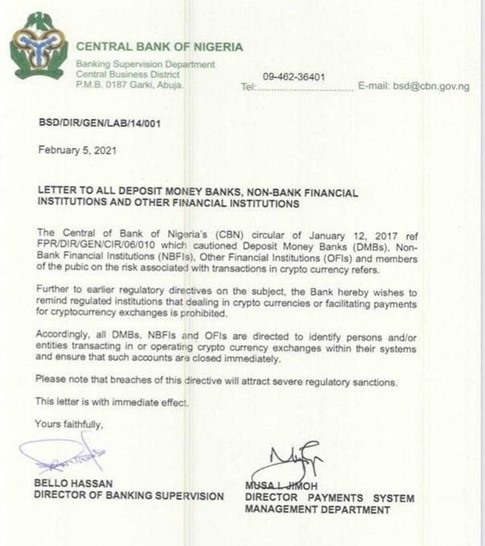Cryptocurrency Ban: Nigerians Say Government Targeting #ENDSARS Promoters
Nigeria has banned the use of cryptocurrency as a legal tender in the country and critics are saying it was targeted at #EndSARS protesters who used cryptocurrency to bypass government restrictions during the protest.

Nigerians are reacting to the directive by the Central Bank of Nigeria (CBN) that financial institutions close all accounts dealing with cryptocurrency exchanges.
The CBN had in a statement directed financial institutions in the country to immediately close all accounts dealing with cryptocurrency exchanges. They accused the government of targeting #ENDSARS promoters through the policy.
In the statement co-signed by Bello Hassan, Director of Banking Supervision, and Musa I. Jimoh, Director of Payments System Management Department, CBN informed Nigerians that dealing with cryptocurrency in the country was illegal.
The bank noted that based on a circular of Jan. 12, 2017 with reference FPR/DIR/GEN/CIR/06/010, all financial institutions were warned against the risk associated with cryptocurrency transactions.
“Further to earlier regulatory directives on the subject, the bank hereby wishes to remind regulated institutions that dealing in cryptocurrency or facilitating payments for cryptocurrency exchanges is prohibited,” it stated.
The bank, therefore, directed all Deposit Money Banks (DBM), Non-Bank Financial Institutions (NBFI) and Other Financial Institutions (OFI) to immediately identify cryptocurrency holders and ensure their accounts were closed.
It warned that any breach of the directive would attract severe regulatory sanctions.
Nigerians React
Following the directive, Nigerians have taken to social media to show their anger.
The terms “Crypto” and “BitCoin,” the most popular crypto currency activities in Nigeria, have become the top trends on Twitter.
Several users accused the Federal Government of using its powers to stop crypto transactions due to the role digital money played during #EndSARS protests across the country.
The protesters who called for the end of police brutality in the country, generated financial support and external funding using cryptocurrency.
The CEO of Twitter, Jack Dorsey, particularly promoted a link seeking for funding to support the protests using cryptocurrency.
“It just occurred to me that there might be a connection between the new CBN policy on crypto and the #EndSARS protests,” tweeted Mark Amaza (@amasonic).
DJ Switch (@dj_switchaholic), a frontline #EndSARS protester who is now seeking asylum in Canada said Nigerian authorities should spend their time blocking terrorists’ accounts instead of banning cryptocurrency.
“If the ban on crypto by CBN is true ehn, it points yet again to the ill informed, backward, poverty promoting dinosaurs leading us. Use your time to investigate and close accounts sponsoring terrorists in the country if you don’t know what to do!!! GAWD,” she tweeted.
On Facebook, Gimba Kakanda, a columnist and analyst on socioeconomic issues in Nigeria, said Nigeria would reach 2021 in 2300 due to its outdated and detached policymakers.
“We are likely to catch up with the world in the year 2300. Dear descendants, if this is still online then, kindly note that it’s a decision of globally detached, slothful and outdated policymakers unprepared for the dynamics of international political economy,” he posted.
Rabi’u Biyora, a Kano State based cryptocurrency guru and one of the leading dealers of digital money advised Nigerians to immediately transfer their money before closing their accounts.
“I advise Nigerians with money in their bundle wallet, ruqqu wallet and all other wallets to quickly withdraw their money,” he posted in Hausa.
Is Cryptocurrency A Security Threat?
A report by RAND Corporation, a nonprofit that helps in decision making through research and analysis, concluded that non-state actors, including terrorist and insurgent groups, could increase their political and/or economic power by exploiting virtual currencies (VC) such as BitCoin as a means of illicit transfer, fundraising and money laundering.
The report said, “VC may be an attractive alternative for non-state actors who look to disrupt sovereignty and increase their own political and/or economic power by displacing state-based currencies.
“VC deployments are particularly attractive in developing countries and in countries undergoing internal turmoil, where the existing financial infrastructure is either insufficient or weakened.
“The rapid deployment of a VC over a large geographic area would likely be less complicated than deploying more common currencies, such as those based on commodities or paper-based currencies.
“Examples of relevant non-state actors considered here include terrorist organisations, insurgent groups, drug cartels and other criminal organisations.”
The non-profit said that there was ample evidence that organised non-state actors – especially cybercriminals, used existing VCs.
However, RAND said there was no significant evidence that these actors were regularly conducting standard economic commerce using a VC. It said rather, VCs were only used as a means of secure, anonymous currency transfer for specialised services.
Support Our Journalism
There are millions of ordinary people affected by conflict in Africa whose stories are missing in the mainstream media. HumAngle is determined to tell those challenging and under-reported stories, hoping that the people impacted by these conflicts will find the safety and security they deserve.
To ensure that we continue to provide public service coverage, we have a small favour to ask you. We want you to be part of our journalistic endeavour by contributing a token to us.
Your donation will further promote a robust, free, and independent media.
Donate HereStay Closer To The Stories That Matter





